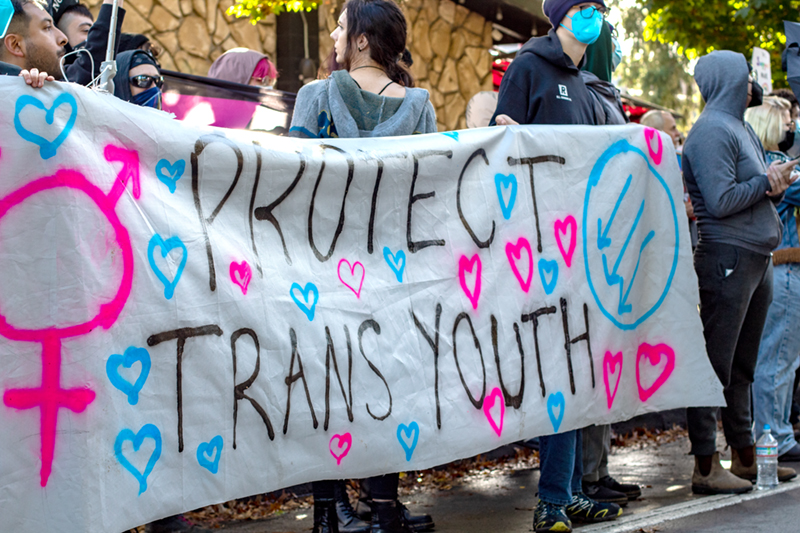Biden administration removes Trump policy allowing child welfare agencies to discriminate against same-sex parents
HHS argues that religious freedom claims should not necessarily trump generally applicable nondiscrimination laws.

The Biden administration is reversing Trump-era actions that allowed federally-funded child placement agencies to flout nondiscrimination rules by refusing to place children with prospective parents based on any number of personal characteristics, including their sexual orientation, age, marital status, and religion.
On Thursday, the U.S. Department of Health and Human Services announced it was rescinding waivers granted by the Trump administration to three states — South Carolina, Texas, and Michigan — allowing faith-based foster care and adoption agencies that contract with state agencies to continue receiving federal money despite discriminating against prospective parents on the basis of their purported religious beliefs.
Under the Trump administration, HHS viewed the religious exemption for faith-based child welfare agencies as necessary to allow them to continue operating without being forced to violate their religiously-based views on sexuality or marriage, in the case of same-sex couples. The Trump administration took the view that the nondiscrimination protections that the agencies, including the South Carolina-based Miracle Hill Ministries, wished not to abide by infringed upon their rights under the Religious Freedom Restoration Act.
But the exemption also granted agencies significant leeway in who they discriminate against, such as allowing a Christian adoption agency refusing to place a child with a Jewish, Catholic, or Muslim family, or permitting an agency to discriminate against a single foster parent (even a widow/widower) or a parent who is currently part of a couple but who has been divorced and remarried on the basis of the agency’s alleged “religious beliefs” that two-parent families are preferable or that divorce is socially unacceptable.
But civil rights advocates argued that the waivers, beyond being overly broad, violated the intention behind RFRA by facilitating widespread, categorical discrimination against same-sex couples and other groups.
In rescinding the waivers, HHS expressed a similar view, saying it was “restoring proper application of RFRA” by granting waivers, modifications, or alternative accommodations to program requirements on a case-by-case basis, rather than by granting broad, sweeping exemptions, even to states and child welfare agencies that did not request them in the first place.
“Today, HHS reaffirms its important commitment to core American values: HHS will not condone the blanket use of religious exemptions against any person or blank checks to allow discrimination against any persons, importantly including LGBTQ+ persons in taxpayer-funded programs,” the agency said in a statement. “The waivers are inconsistent with the Department’s critical goal of combating discrimination based on religion, sexual orientation, and gender identity.”
HHS is also reversing a Trump-era policy that granted the Office for Civil Rights the sole authority to conduct RFRA compliance reviews and take other proactive steps to ensure the department’s policies are protecting religious freedom, reports The Hill.
“Today’s action supports the bedrock American principle and a core mission of our Department — to ensure Americans have access to quality health and human services,” HHS Secretary Xavier Becerra said in a statement. “Our action ensures we are best prepared to protect every American’s right to be free of discrimination. With the large number of discrimination claims before us, we owe it to all who come forward to act, whether to review, investigate or take appropriate measures to protect their rights. At HHS, we treat any violation of civil rights or religious freedoms seriously.”
Social conservatives, including Roger Severino, the former head of the Office for Civil Rights at HHS under President Trump — who worked at the conservative Heritage Foundation prior to joining the administration — have balked at the elimination of the waivers, casting it as an infringement on religious liberties. He also accused Becerra of lying about his intention to change OCR’s authority to investigate alleged infringements on religious liberty, according to Fox News.
Sasha Buchert, a senior attorney with Lambda Legal, noted that while RFRA applies to legislation that could potentially impinge on people’s religious beliefs, it doesn’t mean that merely hold those religious beliefs allows people to flout any law with which they might personally disagree, as social conservatives and the Trump administration had asserted.
“Just because there are protections for religious freedom doesn’t mean they automatically trump any kind of nondiscrimination law in the country,” she told Metro Weekly.

Buchert said the rescinding of the waivers is good news for same-sex couples and other prospective parents in South Carolina, Texas, and Michigan, who can be assured that the waivers won’t be “weaponized” in a way that allows child welfare agencies to receive taxpayer money while continuing to discriminate. She hopes the rescission of waivers will send a signal to other states not to request similar waivers.
“We need to continue to make the point that these agencies aren’t just religious entities out on their own. They’re subsidized by us, by me and you. When we pay our taxes, we’re paying for them,” she said. “And I think there’s a common understanding among Americans that we understand our government should not be encouraging or imposing discrimination through that funding.”
Kierra Johnson, the executive director of the National LGBTQ Task Force, praised the Biden administration’s decision to rescind the waivers in a statement.
“Today’s action by the Department of Health and Human Services will prevent ongoing discrimination, protect religious freedom and expand civil rights and equal opportunity for LGBTQ people,” Johnson said. “The U.S. Constitution does not allow government to subsidize private entities that discriminate against us for who we are and who we love.”
See also:
Advocates: At least 47 transgender Americans lost their lives to violence this year
HRW: To curb anti-transgender violence, address the issues that make trans people vulnerable
Support Metro Weekly’s Journalism
These are challenging times for news organizations. And yet it’s crucial we stay active and provide vital resources and information to both our local readers and the world. So won’t you please take a moment and consider supporting Metro Weekly with a membership? For as little as $5 a month, you can help ensure Metro Weekly magazine and MetroWeekly.com remain free, viable resources as we provide the best, most diverse, culturally-resonant LGBTQ coverage in both the D.C. region and around the world. Memberships come with exclusive perks and discounts, your own personal digital delivery of each week’s magazine (and an archive), access to our Member's Lounge when it launches this fall, and exclusive members-only items like Metro Weekly Membership Mugs and Tote Bags! Check out all our membership levels here and please join us today!


























You must be logged in to post a comment.